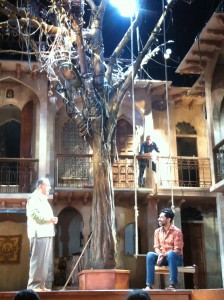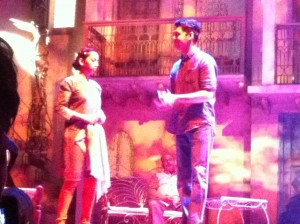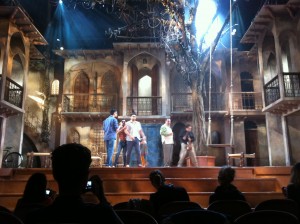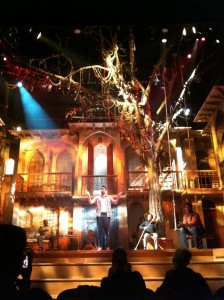I attended the press night of the RSC’s 2018 production of Macbeth but paid for my own ticket and lodgings.
Continuing my long-term project to see all of Shakespeare’s canon on stage, and a 2018 ambition to see more regional theatre, I left London for Stratford-upon-Avon. The last time I was here, making my radio documentary, the Royal Shakespeare Theatre was still undergoing reconstruction. So this was my first visit inside. The floorboards of the stage from the 1932 theatre have been salvaged and used around the outside of the auditorium in the rebuilt structure, a lovely touch. However, as Shakespeare wrote, the play’s the thing – and thats why I was here.
The cons – I was in an aisle seat to the extreme right of the thrust stage, which was mostly fine, except there were text projections above the stage which I couldn’t see. There was also a kind of mezzanine second stage á la the Globe Theatre I couldn’t see almost any of, but performers appeared there sometimes.
A digital clock at the mezzanine level began counting down after Macbeth kills Duncan, giving a helpful indicator of how long is left until the end of the play. However, in this action-light production, it felt a little like an (albeit fairly lenient) prison sentence marking the minutes until we were to be granted freedom. Get rid of it.
The three witches are played by three small girls clutching stuffed bears. Their key “boil boil” scene is moved to much later in the play than usual. I am not a Shakespeare scholar; I cannot wail feverishly about “the text” being butchered. But I noticed this change, and also that all the witch scenes were much shorter than those I have read in the First Folio, presumably to ease the load on the child actors. This does them a disservice, as the RSC should know from its productions of Les Misérables and Matilda the Musical that children acting can easily match adults in talent and stamina.
So to the adults. The famous Macbeth and Lady Macbeth. Co-opted to describe the couple who cheated to game Who Wants to be a Millionaire? into giving them ill-gotten gains back in 2001 (a genius connection perhaps, but I’m seeing Quiz, James Graham’s exploration of the saga, next month). They were hardly on stage together and lacked chemistry when they were. It’s early in the run, perhaps, but I was disappointed. Christopher Eccleston is an emotion-driven, passionate actor – what made him such a good Doctor, and this is his Royal Shakespeare Company debut. Niamh Cusack I cannot particularly recall seeing in anything before, although I know the name. I didn’t feel that she was tormented much. Again, chemistry.
I must give a special mention to Ed Bennett as Macduff. Besuited, he was the spit of John Krasinski’s Jim from the U.S. version of The Office. He is a very low-key performer, his grief at the murder of his family palpable but still movingly understated, until the bubble bursts in the final scene, and he does for Macbeth. I saw him stand in for David Tennant in the title role of the RSC’s London run of Hamlet in 2008, and loved him. The last decade, in which he has worked consistently for the Company, have only improved his mastery of the craft. It was thoroughly enjoyable to see him again.
Look, overall, I wouldn’t rush to see this production. It’s coming to the Barbican in October and it will be likely fairly well received. It seems it is better than the National’s current production lead by Rory Kinnear and Ann-Marie Duff, which apparently relies on gore and an odd staging to draw the audience. So it’s up to you.
Macbeth by William Shakespeare, director Polly Findlay, is at the Royal Shakespeare Theatre, Stratford-upon-Avon, until September, and then at the Barbican Theatre, London, from October until January 2019. *** / *****




